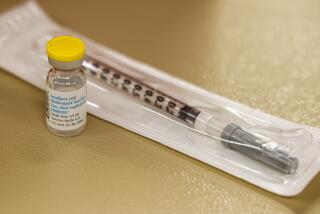Aim AIDS Prevention at Youth, National Panel Advises : Health: Facts need to be explained to teen-agers, whose virus infections take a delayed toll, report says. Few employers have HIV programs, experts add.
- Share via
WASHINGTON — The National Commission on AIDS, warning that the epidemic “threatens a new generation of Americans,” called Wednesday for greatly expanded prevention programs for the nation’s youth, saying that educational efforts must directly address issues of sexuality and abstinence, condom use and availability.
“We will never break the back of the epidemic without a tough, explicit, culturally appropriate delivery of facts to our teen-agers,” Dr. David E. Rogers, vice chairman of the 15-member commission, said in a statement accompanying the commission’s report. “We have let issues of taste and morality interfere with the delivery of potentially life-saving information to young people.”
In a second report, also released Wednesday, the commission urged that the country’s workplaces “move beyond denial” to develop in-house AIDS policies and education programs.
“As more and more companies have employees with HIV disease, employers must put in place policies for HIV-infected workers that provide for them to remain productively employed, without discrimination, for as long as possible,” the panel said. “At too many work sites managers and employees are in states of denial, complacency or ignorance.”
The bipartisan commission, which was created to advise Congress and the White House on combatting the epidemic, recommended that President Clinton set an example by ordering a federal employee HIV education program, starting with the White House staff.
In its report on AIDS in adolescents, the commission said that 1,267 cases of AIDS nationwide among teen-agers ages 13 to 19 had been reported as of March.
The number of cases among 20- to 29-year-olds, however, actually is of greater significance, since AIDS can take 10 or more years after infection to develop. As of March, 10,949 cases of the disease had been reported among 20- to 24-year olds, and 44,171 among 25- to 29-year-olds, the panel said. These individuals represent about 20% of the nation’s total caseload “and were probably infected as teen-agers,” the report said.
The commission reiterated a previous recommendation that the President develop a major prevention initiative, including special programs directed at youth. Such services should pay particular attention to young people in high-risk situations, such as runaways, substance abusers, gays and school dropouts, the report said.
The panel also urged Congress to approve legislation creating more comprehensive services aimed at young people and said that more behavioral research is needed on teen-agers in an effort to develop new and more effective strategies.
The panel also called on the entertainment industry and other media to develop ways to convey positive messages to adolescents on AIDS and other sexually transmitted diseases and drug-use risk reduction, saying that the media “are pervasive, lacing daily living with contradictory messages about sexuality, alcohol and other drug use and violence. . . . Story lines often portray the kinds of behaviors that are directly counter to those that HIV educators attempt to reinforce.”
The commission also called for networks to lift the ban against condom advertising, saying that such commercials would be a “potentially valuable path toward normalization and acceptance of condoms, condom use and responsible sexual behavior.”
In its workplace report, the commission said that only about one-fourth of the nation’s largest private sector employers have AIDS policies and programs and that the number of such programs in smaller businesses, which provide the majority of employment in the United States, is “minuscule.”
The commission cited a recent opinion poll conducted by the National Leadership Coalition on AIDS, an organization that specializes in business and labor AIDS policy issues, which showed that, although 75% of workers surveyed believe their employers should provide AIDS education, only 28% reported receiving any.
“Often, when we think of the great need for AIDS education, we think of teens and the schools,” said Larry Kessler, a commission member and director of AIDS Action Council in Boston, the largest AIDS service organization in New England.
“But in the workplace, parents of these teens often have co-workers with AIDS or HIV,” he continued. “So the need is just as great for education and compassion to make the workplace an area where everyone pulls together and people with AIDS continue to enjoy their productive days in peace and safety.”
Among other things, the commission recommended that the President establish a White House AIDS education program and direct his Cabinet secretaries to implement similar programs in their departments. It said that the Small Business Administration should designate an AIDS coordinator to assist small businesses.
More to Read
Sign up for Essential California
The most important California stories and recommendations in your inbox every morning.
You may occasionally receive promotional content from the Los Angeles Times.













